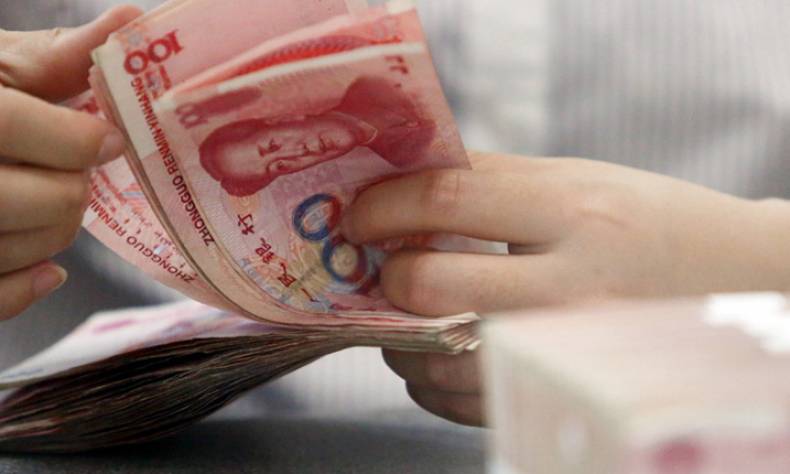
China Credit Flight Soars in 2015 As Yuan Uncertainty Abounds
With the Chinese renminbi, also known as the yuan, taking a hammering in recent months, and the domestic economy no longer seen at home as the bounty it once was, capital flight has become enough of a risk that China is upping credit controls to try and stem the flow.
Source: XE.com
China has made a big deal in the past about it wanting reserve currency status for the yuan (which it got on Dec. 1 when the IMF announced the yuan as the fifth currency to make up the IMF’s Special Drawing Rights reserve asset). Some observers have stated that the yuan is set for increased devaluation in the near future due to a lack of confidence in the slowing economy. The big question, however, is how far the yuan will drop if it’s allowed to float freely (against a basket of currencies, not only the U.S. dollar). Some say 10 percent, some say 15, but the hesitance to let it tumble in one go, a.k.a. the rip-it-off-quickly Band-Aid approach, is seemingly only prolonging the inevitable.
Speaking in New York on Jan. 11, Han Jun, a senior Chinese economics and financial affairs official, called the assertions that a large devaluation is coming “ridiculous and impossible.” Han went on to give assurances that China does not plan to manipulate the currency to get an “unfair competitive advantage” regarding exports, and that confidence in the yuan should remain strong despite the slowing economy. Down with short sellers, the battle cry calls out!
Global sentiment in China’s economy is at its lowest in some time, and to slowly try and keep everything afloat when it may end up dropping anyway is simply putting off the inevitable. If this sounds familiar, it’s because it is. Stock market national team, anyone?
And so as the Chinese populace waits with uncertainty surrounding the currency’s future, then comes the threat of capital flight. A report released Jan. 20 by the Institute of International Finance showed just how serious the problem is for China.
The report estimates that of the $735 total net capital outflows from emerging markets, $676 billion comes from China. That is almost 92 percent of all emerging market capital outflows. A recent Bloomberg article estimated the total capital outflows from China in 2015 at over $1 trillion.
Chinese investors are worried about the further devaluation of the yuan as well as the lack of investment opportunities amid a slowing economy at home. From investment in real estate to overseas stocks and bonds via the Qualified Domestic Institutional Investor (QDII) scheme to converting RMB into dollars to the old faithful of gold, the lack of confidence in investment at home is beginning to take its toll on foreign exchange reserves (which fell by $109 billion in December, according to the Wall Street Journal) and worry Chinese policymakers.
Speaking at the World Economic Forum in Davos on Jan. 23, Haruhiko Kuroda, the current Governor of the Bank of Japan, recommended that China implement more stringent capital controls in an attempt to stabilize the RMB without eating away at its foreign exchange reserves. These recommendations were not rejected by Christine Lagarde, managing director of the International monetary Fund, despite the RMB’s recent addition to the reserve currency basket known as the Special Drawing Rights (SDR).
What Lagarde did call for was better communication between Chinese officials and financial markets. These comments were backed up by U.S. Treasury Secretary Jack Lew in a separate interview with CNBC, with Lew saying “the communication has been uneven. It has not been clear.”
It appears that China has dialed up its capital controls of late, although perhaps not the degree that Governor Kuroda would like. Dan Harris wrote an excellent piece on Jan. 16 titled “Getting Money out of China–What the Heck is Happening” for the excellent China Law Blog saying how “China banks seem to be doing whatever they can to avoid paying anyone in dollars.” Other means of exporting capital such as using the currency quotas of friends and family ($50,000 per Chinese citizen) and the underground networks that run through Hong Kong and Macao are also facing increased scrutiny, according to the Australian Financial Review.
How the Chinese economy will fare in the months to come depends greatly on who is asked. From Governor Koruda to UK Chancellor of the Exchequer George Osbourne to Credit Suisse CEO Tidjane Thiam, there is a degree of optimism rooted in the belief that the world is overreacting and everything will be OK in the long-term. And then there is the other side of the debate, led by investment maven George Soros who stated at the Davos forum that China is headed for a hard landing–but that they could manage it. (In response, the People’s Daily published an op-ed warning Soros of “going to war” against the yuan, calling such a move “doomed to fail.”)
What most international observers agree upon, however, is that the Chinese system needs dramatic reform and that the reactive responses utilized in recent times of financial uncertainty are not going to make much of a difference in the long-term if not back with systemic change. We shall see.
[Update: Chinese Premier Li Keqiang told IMF managing director Christine Lagarde that China has no plans to devalue the yuan continuously and is only trying to balance it against the dollar with recent intervention. In saying that, the release dates for a number of investment vehicles under the QDII scheme have been delayed, according to Reuters, as the government tries to stem the tide.]
 Facebook
Facebook
 Twitter
Twitter
 Linkedin
Linkedin
 Google +
Google +












